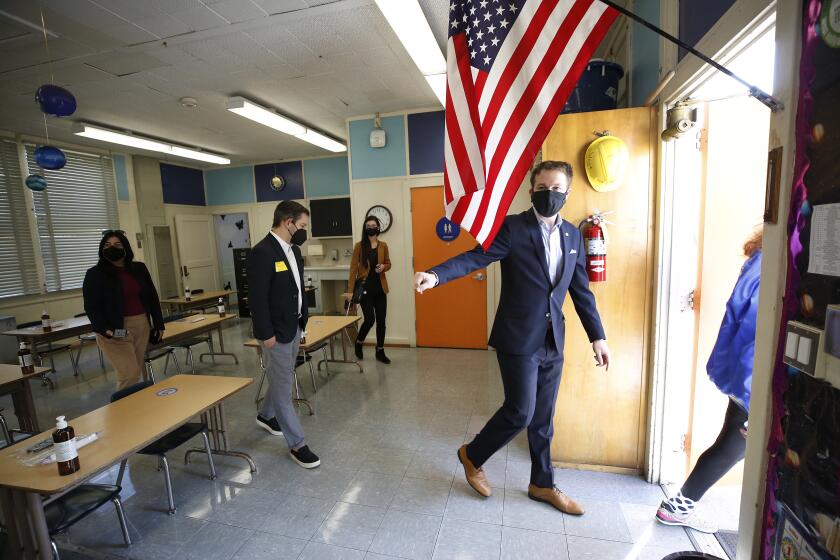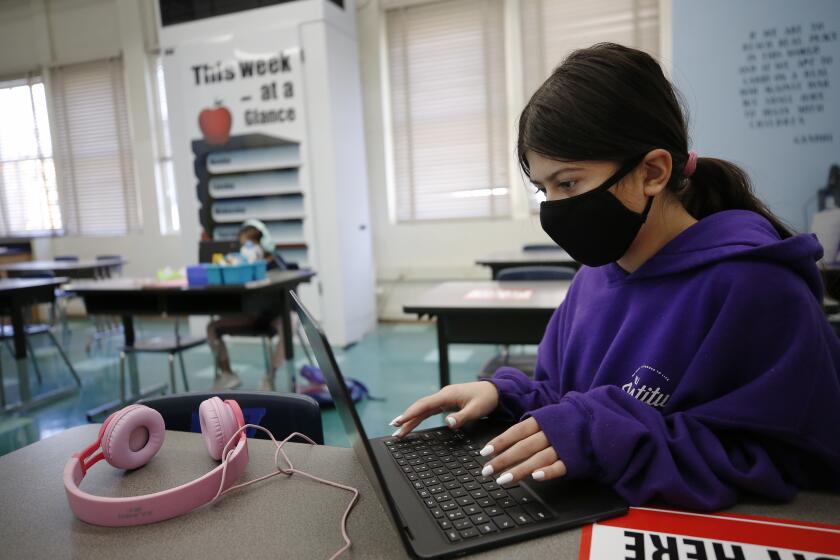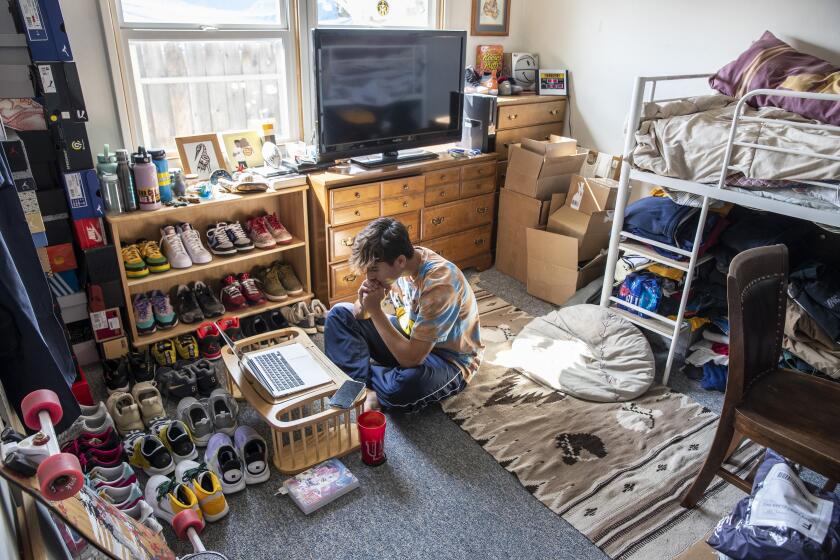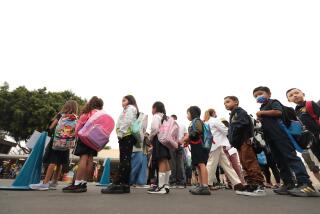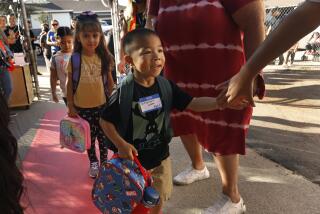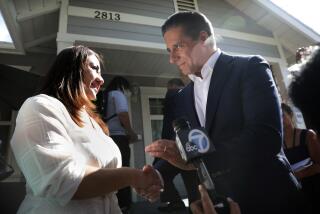Why some high school students aren’t ready to go back to school, despite the isolation
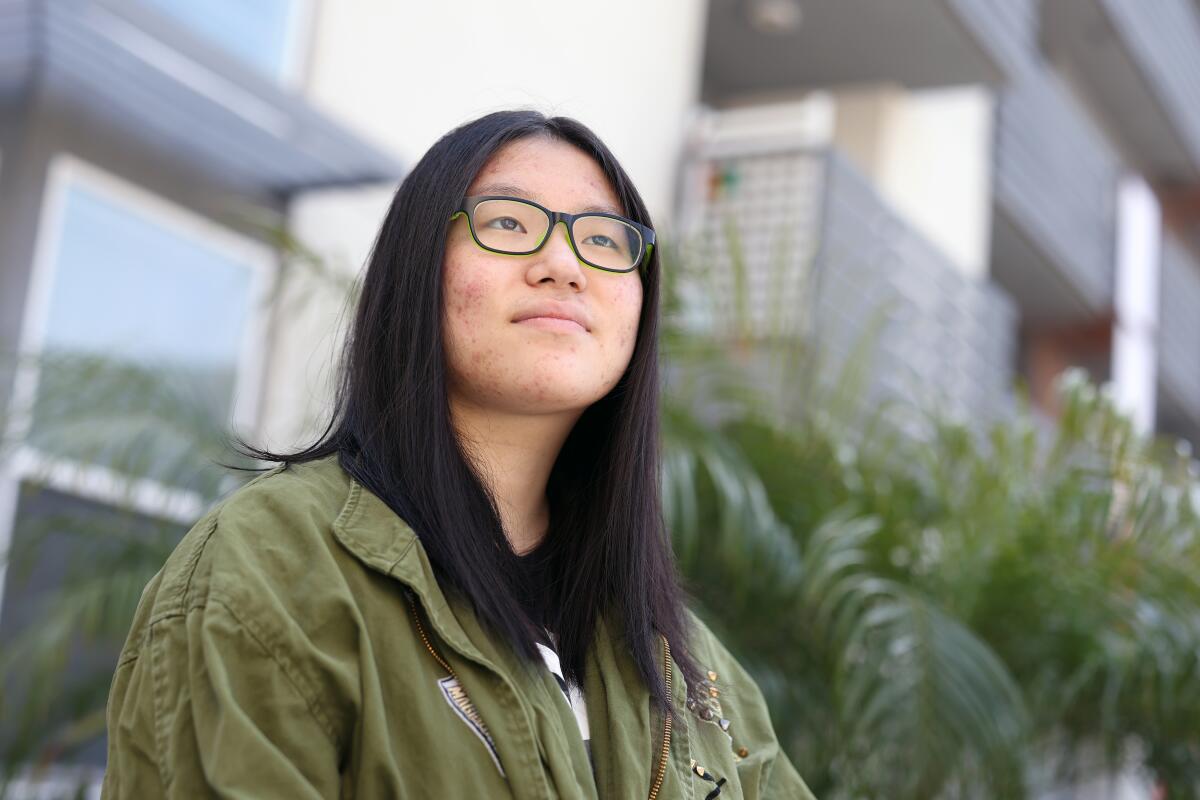
High school senior Isabell Diaz has a routine. She rolls out of bed half an hour before her 9 a.m. class at Los Angeles High School. On breaks, she steps away from the screen to eat breakfast or complete chores. She has learned how to navigate online assignments and virtual club meetings.
So when she learned that her school would open in late April, she had mixed emotions.
“My initial thought wasn’t ‘oh my gosh, yay.’ It was ‘OK, are we sure about this? How is this going to work?’” the 17-year-old said. Then fear set in — she saw how COVID-19 crept into her home in early December and knocked down her father and two sisters. When she realized she would take all her classes online while stuck in one classroom all day, she knew her answer: No.
High school students have trudged through a year of isolation as their school lives morphed before their eyes. Theirs is a year of lost milestone experiences — missed proms, sports games and friendship bonds. Studies have pointed to increasing mental health problems. And yet it is high school students, more than any others, who are opting to finish the year online.
In the Los Angeles Unified School District, the second largest in the nation, 84% are staying at home. Moderate to high numbers are also seen across other area school districts.
The theme of the moment is that L.A. schools are safe — but it’s hard to turn on a dime after months of a contrary message.
In interviews with high school students throughout Los Angeles County, many said they have come to terms with the fact they would not return to the same campus experience they left behind. And while returning may assuage some of the isolation and difficulties of distance learning, they said it’s not worth the health risks when weighed against a vastly diminished schedule.
“We kind of have to accept what’s going on right now and try to keep everyone safe until this is all over,” Isabell said. “We’ve made it this far; we can make it another two and a half months.”
To date, 20% of California high school students have an option to return to school. Complex high school scheduling, with student movement through different classes — as well as their age, which increases the risk of developing COVID — has made for slower and more cautious reopenings.
In L.A. County, 25 school districts are planning to bring back at least one grade level between seventh and 12th in April, according to the L.A. County Office of Education. Three more districts plan to reopen in May.
L.A. Unified high school students, who are on spring break this week, said they understand conditions are improving, but the pandemic is not over. There are still risks, they said, if they go back to school.
Some worry about whether classmates will follow safety protocols, like mask-wearing and social distancing. Many of them have settled, finally, into a routine with distance learning. For LAUSD students, they say the Zoom-in-school format is not worth adapting to an entirely new schedule. Others said they can’t shake off the unpredictability of the virus — cases could spike again.
Kahlila Williams, a senior, misses her school’s Black Student Union meetings. She misses her friends at the Girls Academic Leadership Academy, which shares a campus with L.A. High. But, she asked, what really is there left to salvage of her high school career in the time that remains?
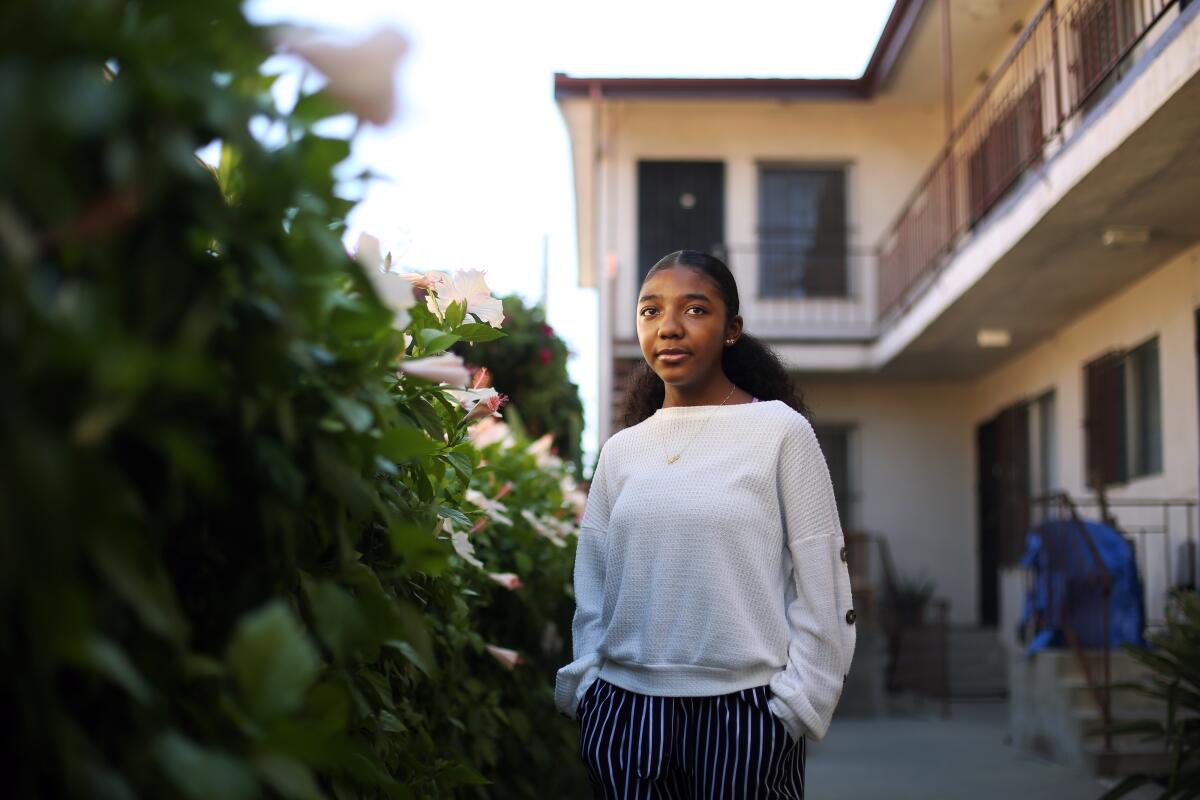
“For me being a senior, I personally feel like there’s not really any point of going back for two months,” she said. “Everything is still limited. We wouldn’t have that same experience.”
“It’s not like I’m going to be able to have a prom. We don’t know if we’re going to be able to have an in-person graduation,” she added. “Yeah, I’ll get to see my friends from a six-feet distance and be in the same classroom as them, but at the same time, I can find ways to make it work outside of school.”
“The rush of opening next month is just too unpredictable and too risky for me,” Kahlila said.
Salma Berumen, a junior at Lincoln High School, has a difficult time finding her voice online — it’s hard to speak up knowing all her classmates are listening in. Salma has maintained her A’s and Bs, but it has meant extra hours poring over her textbooks. Still, a return to campus does not feel worth it.
“It could be potentially dangerous,” she said, especially if a classmate contracts COVID-19 and it takes days to trace. Both of Salma’s parents got COVID-19 in December. It was scary, she said, although they recovered. She is concerned about the risk she’d be taking with her extended family — and is staying home.
Mina Lee, a junior at John Marshall High School, said she and her family have adjusted to their online learning routine. She knows that if she went back, her parents would have to once again rearrange their schedules. Instead her younger siblings will likely go back, while she remains in distance learning.
Her mother also had other fears about sending her back, in a pandemic environment of increased violence against Asian Americans. She worries that Mina and her siblings could feel uncomfortable at school.
For Mina, the hybrid setup won’t make up for time lost between classmates and seeing teachers. Some of her friends have drifted apart, she said, but the in-person plan won’t bring them together.
“I don’t really know if I would want to go back if it were still hybrid for my senior year,” she said.
The greatest academic harm fell on younger students and those who were faring worse before the pandemic, the report said.
Other school districts may also see low in-person attendance.
The Duarte Unified School District, which is 74% Latino, is preparing to bring back its youngest students the week of April 5. Supt. Gordon Amerson said the district is still discussing reopening plans for secondary schools.
Sarah Dowiri, a junior at Duarte High School, said she, too, is adjusted to a remote schedule, with more time for activities she enjoys, including the school feminist club and participating in the Duarte mayor’s youth council. And while she knows other students will benefit from in-person learning, she has no desire to start over with little time left in the school year.
“I feel like it would be very abrupt to go back to school all of a sudden,” she said.
On a recent Monday, one of her teachers held an informal poll to see how many students would return. In her class of 30, five students said they would go back. Because her friends are not returning, the experience would still feel isolating, she said.
“I’d rather be alone in my pajamas,” she said.
Farther east, the Covina-Valley Unified School District is preparing for an April 12 high school return under a schedule where students attend in-person classes twice a week then online at home. The school district is 78% Latino. Across all secondary schools in the district, about 54% of students will return for in-person learning, according to survey results.
Naia Pizarro, a student at Northview High School, said she was surprised to see how quickly her school was moving to reopen.
“I just don’t feel prepared to go back,” the senior said. Feeling safe, she said, would include vaccines for herself and classmates. In one class of 13 students, she said, three students plan to go back. Ultimately, Naia supports her family decision to keep her and her two siblings in distance learning.
“If there’s three of us, it’s kind of three times the chance to bring COVID back,” Naia said. “You’re kind of risking a lot.”
High school students The Times spoke to have struggled with online learning, and they miss their friends. But they’ve worked to cope and seek out hope.
Still, some students are embracing their return to campus.
Campbell Hall High School junior JJ Hoffman recently visited campus for the first time in about a year. The private Episcopal school with annual high school tuition of $42,690 has moved quickly to bring students back. About 45% of students in grades nine through 12 returned in March for a trial hybrid schedule, a school administrator said.
JJ said he was underwhelmed by the return: The library where he used to hang out with his friends remained closed. And because his school split the cohorts by last name, most of his friends attend on different days.
Yet JJ plans to finish the school year in person. He said he feels safe with the masking requirements and plexiglass barriers on outdoor tables. “As long as it goes pretty smoothly, and they figure out how to make it as best as they can,” he said, “I think I’ll be happy in hybrid learning the rest of the year.”
Kayla Coulter is one of 719 students who plan to return to Long Beach Unified’s Cabrillo High School, which serves 1,979. Seniors, like Kayla, will start on April 19. Unlike LAUSD, Long Beach Unified is permitting students to move from classroom to classroom.
Kayla started her second semester off with two failing grades in classes she never thought she would fail: English and AVID, a college prep course. She can sleep in thanks to the later start time of online classes, but she has to put in extra hours to better grasp the material she learns in class.
She hasn’t yet heard if her friends will return as well, but was surprised that only about a third of students have said yes so far. “I thought everybody would be back.”
Still, she is excited, even if it’s just a few days a week on campus. She is still trying to figure out what she’ll wear on her last first day of school. “I can’t wait to go back.”
More to Read
Sign up for Essential California
The most important California stories and recommendations in your inbox every morning.
You may occasionally receive promotional content from the Los Angeles Times.
